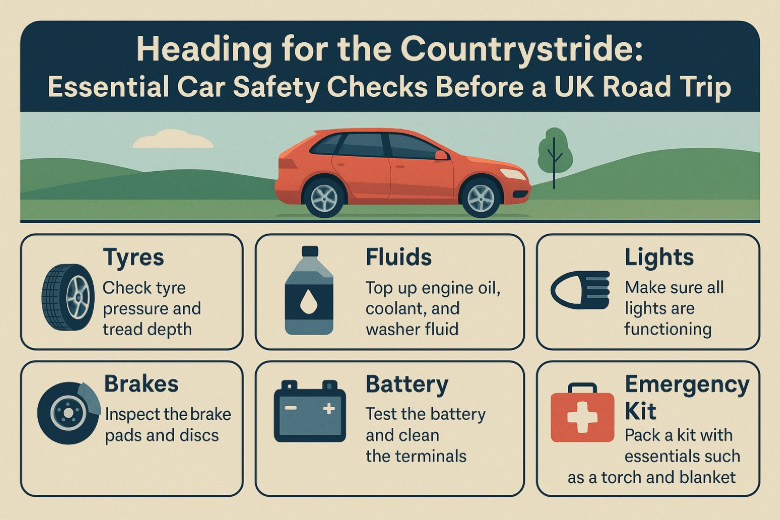Heading for the Countryside: Essential Car Safety Checks Before a UK Road Trip
How often do you think about preparing your car for a trip out of town before you set off? Especially if you often drive from the city to the countryside and know the route by heart. I’m sure you don’t. Statistics from a new National Highways study show that almost a fifth of drivers in the UK (about 17%) admit to skipping important car maintenance checks. However, in reality, during such seemingly mundane trips, unpleasant situations often arise that can ruin your entire weekend. This often happens because the car owner has not noticed a minor malfunction. For example, a small coolant leak can cause the engine to overheat, and if you drive on worn tyres, they can easily be punctured on a country road, etc. If a breakdown occurs in the city, it is much easier to get the car to a repair shop than in rural areas. You may disagree, because you know the routes and probably know the mechanic’s phone number. However, mobile communication often disappears when travelling on rural roads, and you may be left alone with your problem. That is why a thorough check of the car before the trip is not snobbery, but a real necessity and a prerequisite for a safe and comfortable journey.
Top 5 essential checks before travelling
So, we have already figured out what to check in a car before travelling, but, let’s face it, we don’t want to spend a lot of time on it. If done correctly, it takes about 5-10 minutes. So, what needs to be checked?
- First, inspect the tyres. Are there any cracks, foreign objects (stones, nails, etc.) or other minor damage? It is also important to make sure that the pressure in all tyres corresponds to what is specified as normal in the technical recommendations.
- Be sure to listen to the brakes. Squeaking, grinding and vibration may indicate brake pad wear. Also pay attention to the brake pedal. It should not sink.
- Always check the engine oil level with a dipstick before travelling. The right amount of engine oil and its proper quality and cleanliness help the engine not to overheat and prevent engine wear.
- Be sure to check the lighting equipment. Make sure that the headlights, taillights, turn signals, and brake lights are working properly. This will save you from problems when driving at night or in bad weather. AUTODOC experts note:
“Car headlights do more than just brighten the road, they shape how we drive in the dark, through fog, or during sudden downpours. These front-facing lights help you see what’s ahead and make sure that others can spot you too“.
- And the last thing to pay attention to is the condition of the windscreen wipers and the availability of windscreen washer fluid that is suitable for the season.
These simple steps will help you identify car problems at an early stage and save your nerves and money.
The role of rear lights in ensuring a comfortable and safe journey
Rear lights are not only a decorative element of car design, but also a detail that plays a critical role in ensuring safety while driving. It is thanks to rear lights that you can show other cars your location on the road and signal to others that you are about to perform a manoeuvre (turning, braking, changing lanes, etc.). This is especially important in fog, rain and drizzle. That is why it is necessary to check the condition of your rear lights before driving in rural areas, especially in bad weather or at night.
Let me tell you my story. I drive a Volvo V90. This car has rarely let me down and lulled me into a false sense of security. I never paid attention to the rear lights for the Volvo V90 because they always worked perfectly. However, one foggy day, I drove to visit my parents in the village. On the way, I didn’t notice that the right rear light had stopped shining brightly. The car behind me didn’t notice that I was turning and crashed into me. No one was hurt, but the whole situation led to stress, expensive repairs, and wasted time. If your car’s rear lights are dim, cracked, or not working properly, we recommend checking them and replacing them if necessary to ensure good visibility on the road.

Recommendations before the trip: what to take with you?
What should you take with you in the boot to be prepared for unforeseen circumstances while travelling?
- Tyre repair kit.
- Jumper cables.
- First aid kit with everything you need for first aid.
- Flashlight (preferably a headlamp).
- Reflective vest and special cones needed to mark a stop.
- A supply of fuel, motor oil, coolant, and windscreen washer fluid.
Additional information:
